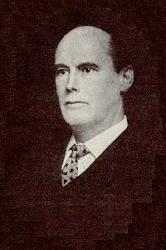
1848 - 1926 Composer of "[O'er the sea, o'er the sea]" in Hours of Singing Born: June 28, 1848, Portland, Indiana.
Died: July 13, 1926, Seattle, Washington.
Buried: Mount Hope Cemetery, Logansport, Indiana.
Giffe grew up in College Corners, Indiana (near Portland), and served in the Army during the closing days of the American civil war. After the war, he attended Liber College, and studied law for two years. While in college, he was a member of the college glee club, and took lessons in the college singing school. Later, he studied with teachers such as J. W. Suffern, George Root, Luther Emerson, Horatio Palmer, and Henry Perkins.
Giffe had a fine baritone voice, and was in demand as a concert singer. He soon became popular as a chorus director and convention conductor. His first book for singing schools was New Favorite, which sold thousands of copies. The Oliver Ditson Company of Boston, Massachusetts, published many of his early works, but Giffe went on to form his own publishing house, the Home Music Company, in Logansport, Indiana. He also edited the Home Music Journal for several years. Later, Giffe became supervisor of music in the public schools in his home town. And he was one of three men selected to deliver an address in Logansport, Indiana, at the memorial services for assassinated president William McKinley.
Giffe and his wife Nancy had no children. His works include:
The Brilliant, 1874
Crown of Gold, with Frank Davis (Logansport, Indiana: Home Music Company, 1892)
The New Deal, with Louis Eichhorn (Logansport, Indiana: Home Music Company, 1898)
A Practical Course in Harmony and Musical Composition
--www.hymntime.com/tch
W. T. Giffe


